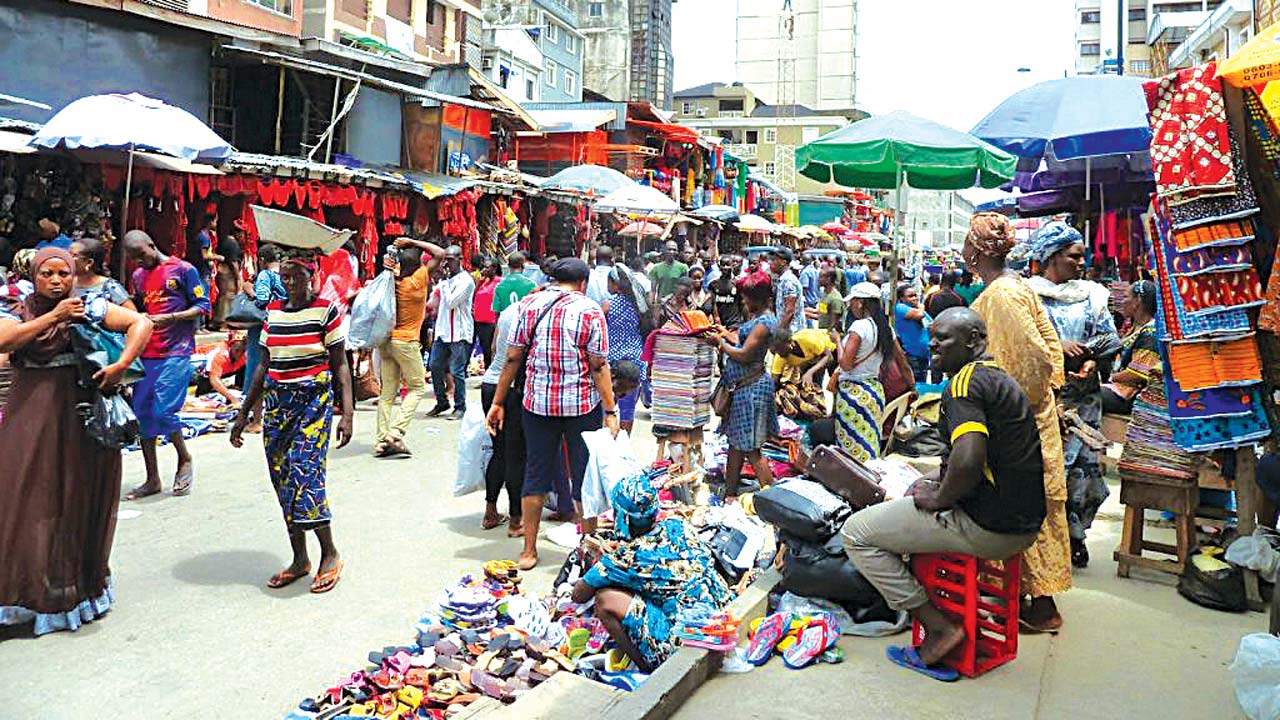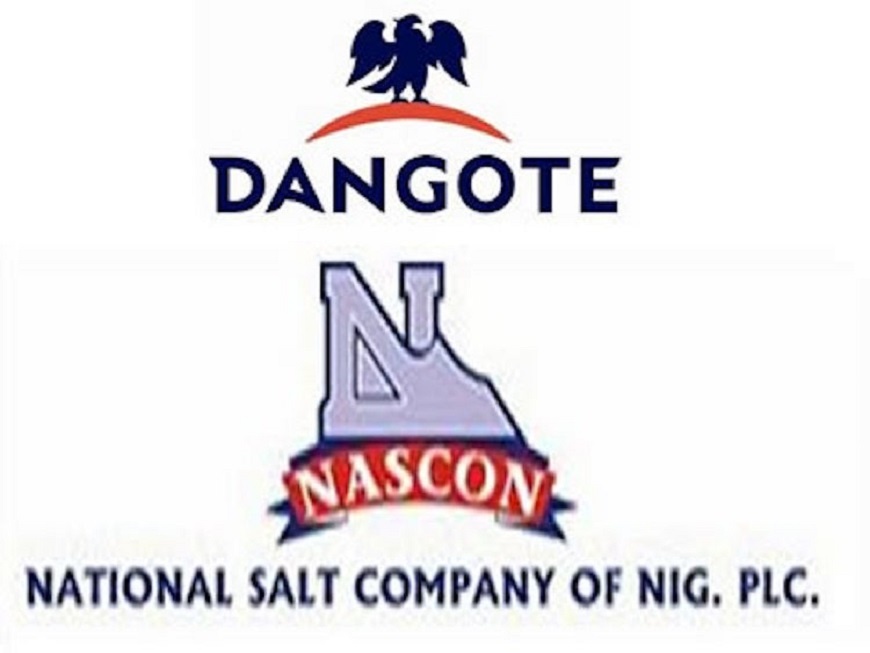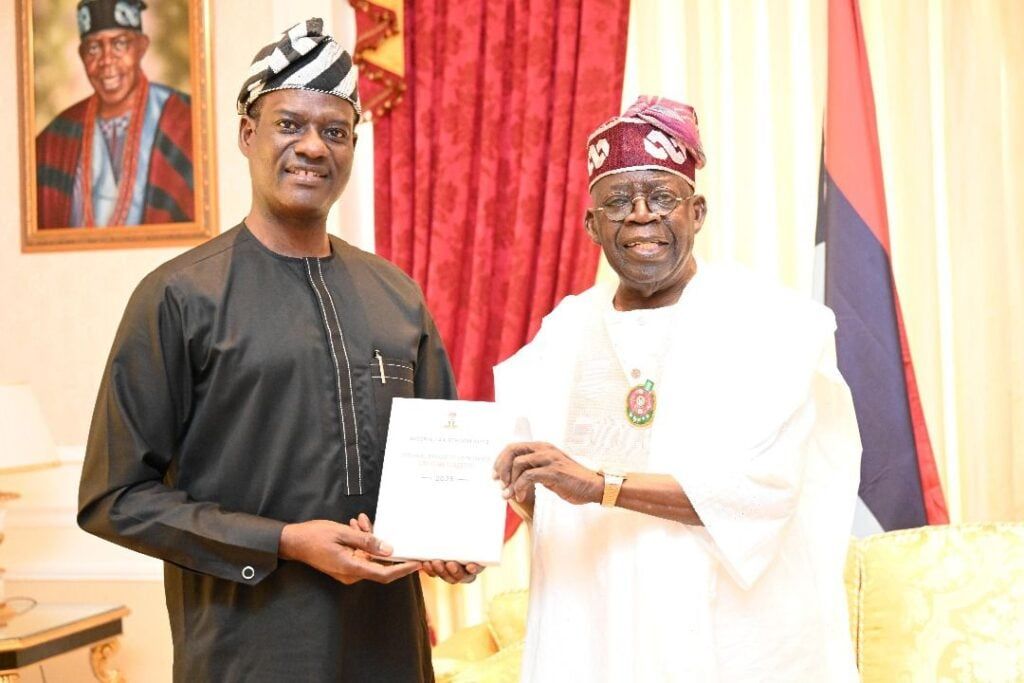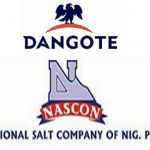Economy
Open-Air Markets Account for 97% of Nigeria’s Retail Sales

By Modupe Gbadeyanka
A new report by the Boston Consulting Group (BCG) has revealed that the retail sales landscape in Nigeria is dominated by open-air markets despite an increase in supermarkets, convenience stores, and other modern formats.
In the survey, it was disclosed that over 600,000 small shops and open-air markets are in the country’s retail space, accounting for 97 per cent of national sales of food, beverages, and personal care products.
The report The Future of Traditional Retail in Africa showed that African consumers on average continue to buy more than 70 per cent of their food, beverages, and personal care products from the continent’s more than 2.5 million small, independent shops despite the rise in e-commerce and changes in consumer behaviour accelerated by the COVID-19 pandemic.
“The willingness of traditional retailers to diversify, and embrace digital solutions coupled with the growing interest of investors to provide digital solutions show they will find opportunities to grow and remain the cornerstones of African economies in the future,” said, Stefano Niavas, Managing Partner in BCG Nigeria, and co-author of the report.
The report noted that modern retail remains very fragmented and is led by international hypermarket brands. Modern chains are struggling to expand due to currency devaluation, underdeveloped and inefficient transportation infrastructure, poor logistics capabilities, inadequate electrical power, and other complex challenges.
More importantly, the digital maturity of shop proprietors is also substantially higher than the national average. The level of financial inclusion varies widely across the region and is generally in line with the general population. While 85 per cent of Kenyan shop managers have a bank account, only 40% of their counterparts in Nigeria have one.
High numbers of African retailers also reported that they feel under pressure from modern retailers. In response to such challenges, traditional shops are diversifying well beyond daily essentials, such as fresh and packaged foods and home cleaning and personal hygiene products. Many small retailers now sell telecom products, such as prepaid cards and SIM cards.
New Digital Solutions
Several digital technology providers are addressing inefficient distribution systems that often force retailers to close their shops for several hours so they can go purchase goods from wholesalers.
The Nigerian B2B digital marketplace Alerzo, for example, enables more than 100,000 users—90 per cent of whom are women—to purchase inventory directly from manufacturers, receive and make cashless payments, and better track their revenues.
Digital marketplace in Nigeria such as Alerzo also facilitates a portfolio of digital services, including airtime purchases, bill payments, and peer-to-peer transfers. In the long run, such platforms aim to provide super apps with a large selection of services.
This would enable them to totally digitize traditional retailers and integrate them into the formal economy. Start-ups are also providing working capital and financial management systems to help traditional retailers grow and run their businesses more efficiently; however, they must overcome a lack of awareness and training among retailers.
The Future of Retail in Africa
The study found that traditional retailers will continue to dominate. But to thrive, they must modernize by offering new services and leveraging opportunities offered by digital solutions.
Niavas added, “Based on our analysis, many small retailers are already aware of the evolving retail landscape and are ready to improve their business premises, quality of products and expand across the country.”
Based on current trends, the modern retail sector in Nigeria, even though it is growing fast, is likely to remain small, and still may not account for more than 5 per cent of retail sales by 2030. Due to structural problems in Nigeria mentioned earlier, foreign investors are likely to remain hesitant about entering the market.
Given the central role that traditional shops will continue to play in Africa’s retail landscape, there will be a number of opportunities for various players in the ecosystem as the environment evolves.
Investment funds can find opportunities to provide capital and management expertise that will enable local modern retail chains to scale up in new cities.
An active start-up ecosystem is interested in providing digital solutions that will solidify the role of traditional retail in Africa and enable the sector to become the commercial interface across the continent.
Digital solutions can help manufacturers of fast-moving consumer foods improve their control over go-to-market strategies and provide data to better understand retailers.
Banks and telecom providers can achieve growth by developing new business models and offers that are adapted to traditional retailers’ needs.
Economy
Nigeria in Talks with China to Expand Yuan–Naira Swap Deal to $10bn

By Adedapo Adesanya
The federal government is in advanced talks with China to expand its existing Yuan–Naira currency swap to as much as $10 billion, a move aimed at easing pressure on the US dollar and narrowing the trade imbalance that heavily favours the Asian country.
The director general and Global Liaison for the Nigeria–China Strategic Partnership (NSCP), Mr Joseph Tegbe, said in Abuja that the government was seeking to renew and scale up the current $2.5 billion swap arrangement to allow businesses transact directly in yuan, reducing reliance on the dollar for bilateral trade.
According to him, the existing swap line, though initially underutilised, is being renewed and expanded, with proposals to increase it to $10 billion.
Mr Tegbe said Nigeria was also fast-tracking export protocols to take full advantage of China’s zero-tariff policy for African countries, set to take effect in May 2026.
“Products like hides, skins, cashew, and aquatic products such as crabs and shrimps, which are often exported informally, will now enter China legally under zero duty,” he stated.
The DG highlighted that beyond trade, Nigeria is pursuing equity-based partnerships with Chinese firms. Notable initiatives. These include China Harbour Engineering Company’s $1 billion investment in the Lekki Deep Sea Port and large-scale developmental projects in agriculture, steel, and poultry.
Nigerian businesses to transact directly in Yuan, avoiding the current need to convert Naira to dollars and then to Yuan, which places additional strain on dollar demand.
“We are in discussions with China to establish a truly workable Yuan–Naira swap arrangement. We already have about a $2.5 billion swap line, and although progress slowed toward the end of last year, we are now looking to renew and expand it.
“What this means for the economy is simple: a Nigerian business should be able to pay in naira into his local bank account here and receive Yuan in China directly to do his/her business. Currently, traders convert Naira to Dollars, and then Dollars to Yuan, which increases demand for the US Dollar.
“But someone trading with China does not need Dollars — they need Yuan. If transactions move directly between naira and yuan, it will significantly reduce pressure on the Dollar–Naira exchange rate,” he said.
He noted that for the swap to be effective, Nigeria’s foreign exchange reserves must be at a comfortable level, a goal being addressed by the Central Bank of Nigeria (CBN) as part of broader efforts to stabilise the currency and facilitate smoother bilateral trade.
“Our foreign exchange reserves must also be at a comfortable level for the swap to function effectively. Without sufficient reserves, the arrangement cannot deliver its full benefits. That is why we are strengthening our FX position and renewing the agreement.
“Businesses have told us the current threshold is insufficient, so we are working to increase it to the equivalent of $10 billion,” Mr Tegbe said.
Economy
Spike in Demand for Salt, Seasoning Products Raise NASCON Revenue by 27%

By Aduragbemi Omiyale
One of the leading salt refiners in Nigeria, Nascon Allied Industries Plc, a subsidiary of Dangote Group, has recorded a 27 per cent spike in revenue for the 2025 financial year.
The financial statements of the company disclosed that earnings stood at N152.7 billion compared with the N120.4 billion achieved in 2024, driven by a robust demand for its salt and seasoning products and improved production stability.
This helped the firm to raise its gross profit by 33 per cent to N73.9 billion from N55.5 billion, as the profit after tax went up by 115 per cent to N33.5 billion from N15.6 billion, and the earnings per share grew by 115 per cent at N12.41, inspiring the board to jack up the dividend payout by 200 per cent at N6.00.
“It is a privilege to present the audited results of Nascon Allied Industries Plc for the year ended December 31, 2025,” the Managing Director, Mr Aderemi Saka, said.
“This year’s performance stands as a testament to our collective resilience and strategic discipline in navigating a demanding macroeconomic environment.
“Our commitment to operational excellence delivered the strongest bottom-line performance in our company’s recent history.
“Revenue grew by 27 per cent to N152.7 billion, reinforced by a robust demand for our salt and seasoning products and improved production stability, while gross profit rose by 33 per cent to N73.9 billion.
“Profit After Tax surged by 115 per cent to N33.5 billion, and this exceptional earnings growth translated into a 115 per cent increase in Earnings Per Share, now at N12.41.
“Reflecting this solid performance, the board is pleased to propose a dividend of N6.00 per share, representing a 200 per cent increase,” he added.
Mr Saka attributed the success of last year to “the 72 per cent expansion of our asset base to N135.3 billion, enabled largely by our strategic investment in new Compressed Natural Gas (CNG) trucks.
“This transition serves a dual purpose: protecting our operations from the volatility of diesel prices while significantly reducing our carbon footprint.
“By strengthening our logistics capabilities, we have enhanced operational independence and secured greater supply chain control, deepening the sustainability of our business model.”
“We concluded the year with a strong liquidity position, as cash and cash equivalents rose by 69 per cent to N41.6 billion, supported by operating cash flows of N43.9 billion.
“This financial strength gives us the capacity to continue investing in technology, infrastructure, and operational efficiency initiatives that will reinforce our market leadership,” he further stated.
“As we look ahead, we remain focused on increasing our market presence, strengthening operational resilience, and executing the long-term strategic initiatives that support sustainable growth.
“With a solid balance sheet and a committed workforce, we are well-positioned to continue delivering value to our shareholders and all stakeholders.
“I extend my sincere appreciation to our shareholders, customers, and employees for their unwavering support. As we move forward, I am optimistic about carrying this momentum into 2026 and beyond,” the MD disclosed.
Economy
Tinubu Picks Taiwo Oyedele as Minister of State for Finance

By Adedapo Adesanya
President Tinubu has nominated Mr Taiwo Oyedele as the new Minister of State for Finance, taking over the position from Mrs Doris Uzoka-Anite.
In a statement on Tuesday, it was announced that Mrs Uzoka-Anite will now move to the Ministry of Budget and National Planning as the Minister of State, marking her third portfolio in the administration, after she was earlier stripped of the role of Minister of Trade, Industry, and Investment and replaced by Mrs Jumoke Oduwole.
President Tinubu conveyed Mr Oyedele’s nomination to the Senate for confirmation in a letter to the Senate President, Mr Godswill Akpabio, on Tuesday.
Until his nomination, Mr Oyedele, from Ikaram, Akoko, Ondo State, served as the Chairman of the Presidential Committee on Fiscal Policy and Tax Reforms, which overhauled Nigeria’s tax system.
The 50-year-old PricewaterhouseCoopers (PwC) alumnus is an economist, accountant, and public policy expert.
He attended Yaba College of Technology, where he obtained a Higher National Diploma (HND) in Accountancy and Finance. He also attended Oxford Brookes University, earning a BSc in Applied Accounting.
He has completed executive education programs at the London School of Economics, Yale University, the Gordon Institute of Business Science, and the Harvard Kennedy School.
Mr Oyedele spent 22 years of his working career at PwC, joining in 2001 and rising to become Fiscal Policy Partner and Africa Tax Leader.
He is also a professor at Babcock University in Ogun State and a visiting scholar at the Lagos Business School (LBS).
-

 Feature/OPED6 years ago
Feature/OPED6 years agoDavos was Different this year
-
Travel/Tourism10 years ago
Lagos Seals Western Lodge Hotel In Ikorodu
-

 Showbiz3 years ago
Showbiz3 years agoEstranged Lover Releases Videos of Empress Njamah Bathing
-

 Banking8 years ago
Banking8 years agoSort Codes of GTBank Branches in Nigeria
-

 Economy3 years ago
Economy3 years agoSubsidy Removal: CNG at N130 Per Litre Cheaper Than Petrol—IPMAN
-

 Banking3 years ago
Banking3 years agoSort Codes of UBA Branches in Nigeria
-

 Banking3 years ago
Banking3 years agoFirst Bank Announces Planned Downtime
-

 Sports3 years ago
Sports3 years agoHighest Paid Nigerian Footballer – How Much Do Nigerian Footballers Earn












